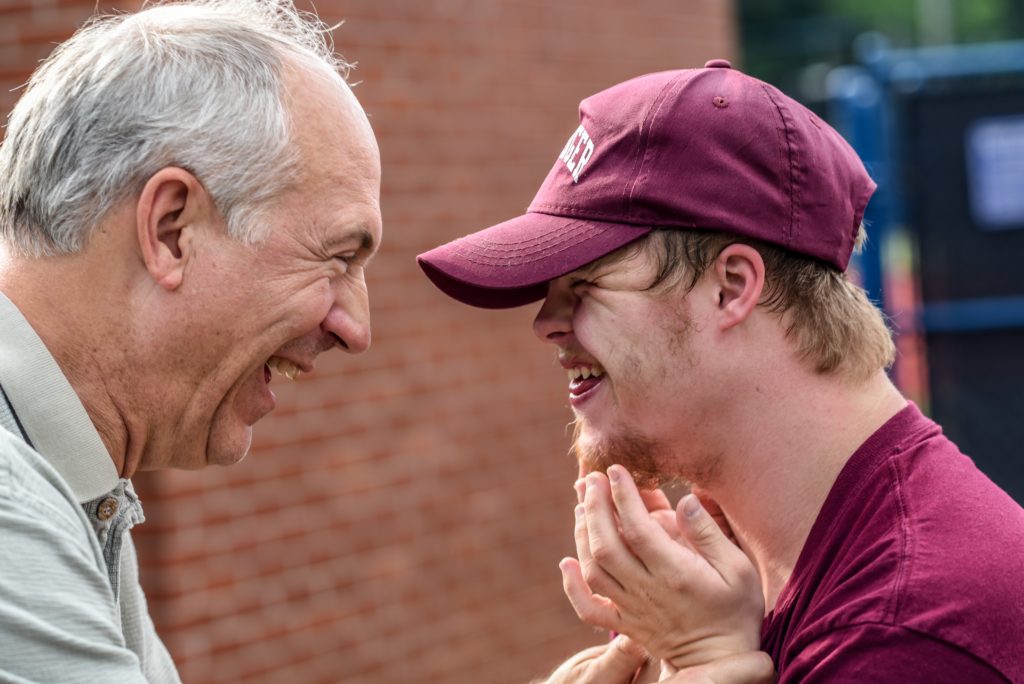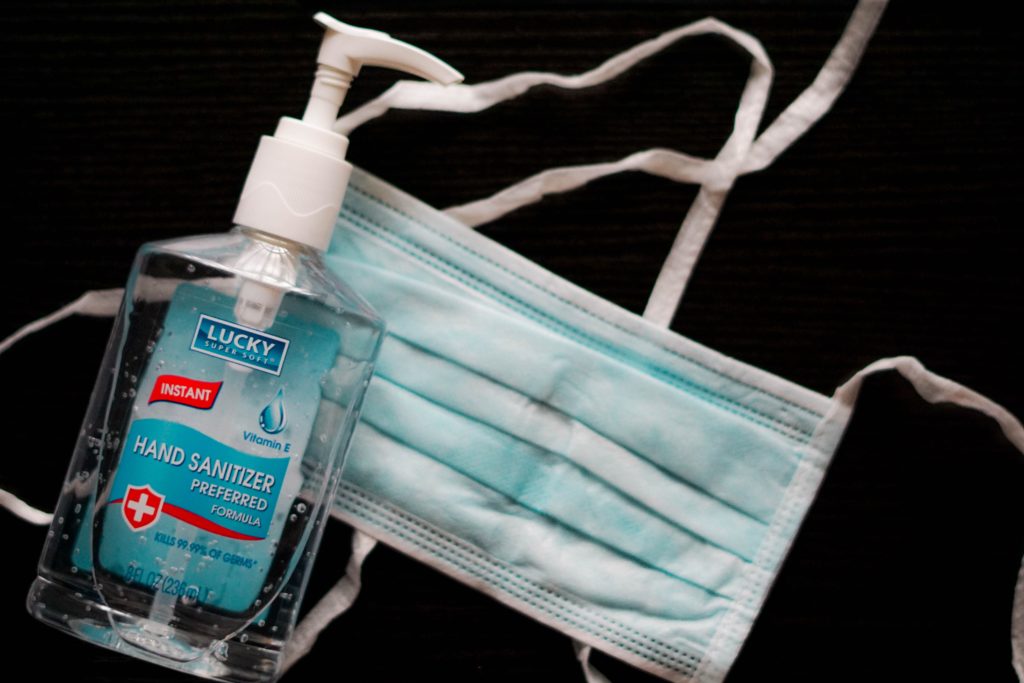Edition 1: 5.24.20
Purpose
This guide offers tips for disability rights activists advocating for visitations and working with healthcare facilities and state governments during the current pandemic crisis about how to ensure healthcare facilities comply with the Americans with Disabilities Act.

Rationale
The paradigm for challenging healthcare practices during this pandemic is a legal one: hospitals must provide reasonable accommodations by following the Americans with Disabilities Act (ADA). Visitor policies for people who need support from others (who are NOT staff of a healthcare facility) must permit a support person or companion to be present to the
greatest extent possible. Hospitals must have protocols in place for providing infection control, screenings, briefings, personal protective equipment (PPE), and related information to such support persons.
Every healthcare facility should have a policy about visitors during the coronavirus pandemic. As an example, Rush University Medical Center in Chicago developed such a policy years ago. This is a general policy but is a good start.
Patients with disabilities who need assistance due to the specifics of their disability may have one designated support person with them. This could include specific needs due to altered mental status, intellectual or cognitive disability, communication barriers or behavioral concerns. If a patient with a disability requires an accommodation that involves the presence of a family member, personal care assistant or similar disability service provider, knowledgeable about the management of their care [and daily living], to physically or emotionally assist them during their hospitalization, this will be allowed with proper precautions taken to contain the spread
of infection or disease.
Definitions
Healthcare facilities are used in this guide, but recommended policies, procedures and protocols apply to a range of institutions: hospitals, nursing homes, long-term care, rehabilitation and specialty care facilities.
Disability rights means what a person with a disability is entitled to, according to Federal laws such as the Section 504 of the Rehabilitation Act and the Americans with Disabilities Act. These laws explain what is required to accommodate a person with a disability in multiple settings. In addition, Section 1557 of the Affordable Care Act describes protections
for people with disabilities to ensure equal treatment. Page 2 of 5
Support persons or companions include family, significant others, partners, personal care assistants or attendants, designated support personnel or other designated caregivers and communicators. A support person helps patients with some disabilities to express and address their basic physical needs that are not apparent to someone who does not know
them. Such help could address discomfort, pain, hunger, thirst, urination, changes in their symptoms or needs, or questions that need to be asked. When these patients are denied access to a support person, they are at substantial risk of receiving substandard medical care and having poorer health outcomes than patients without disabilities.
Medically necessary, in this disability-rights context, means any accommodation needed by a person with a disability to gain maximum benefit from a healthcare professional, treatment and medication. Be careful! In a healthcare environment, the staff of the institution may
interpret this phrase to mean what they believe should or should not be allowed – not what the person with a disability needs to benefit from being in the healthcare setting.
Communication supports includes access to skilled and qualified interpreters, assistive technology, written materials in usable and understandable formats, and the presence of a support person if that is what the person with a disability requires to communicate effectively
and benefit from medical treatment. A support person can assist with providing effective communication with people who are deaf, or hard of hearing, blind, have low vision, or have speech disabilities.

Advocacy Recommendations
There are many ways to advocate for people with disabilities needing support persons during hospitalization or a stay in a healthcare facility. This list starts with the broadest possible advocacy at the state level. Make sure that the policies you are requesting cover all the essentials listed here and that there are ways to monitor healthcare facilities to ensure the enforcement of laws and policies.
- Work with your Governor’s Office and state department of health or public health to ensure that support person policies are required in your state. Work with them to draft needed executive orders, laws, or regulations. See “Elements of an Effective State Policy” below.
- Build relationships with key people in your local hospitals to solicit their support. These people may include individuals in a healthcare facility’s human resources department such as those who recruit and advocate for people with disabilities, the social work department, the patient experience or customer service staff, physicians and nurses involved in the disability community through their professional work, and possibly the risk management office. These allies can make state policies easier to create and monitor.
- Develop protocols that a local hospital can follow. Consider how a person with a disability who requires a support person is likely to enter a healthcare facility. These are procedures that healthcare facilities in your state need to follow. Work with Page 3 of 5
healthcare facility employees and others such as ambulance service providers to ensure their staffs are trained to follow these protocols. - Following the advice of many advocates during this difficult time, ensure that a person with a disability understands how to prepare to enter a healthcare facility. See Preparing for Hospitalization During COVID-19 Pandemic: A Checklist for People
with Disabilities (4/2020). Work with individuals who have disabilities to help them get prepared. - Understand the best or highest standards for protecting people from infections. These are usually referred to as infection control protocols, such as putting on and taking off personal protection equipment (PPE), screening and testing, monitoring and evaluating people to see if they may be infected with the COVID-19 virus.
Work with state government to ensure that similar policies are in place for nursing homes, long-term care, rehabilitation, and specialty care facilities.
Elements of an Effective State Policy
These are procedures that are important for healthcare facilities to follow:
• The rights and needs of the person with a disability who require support in a hospital or healthcare setting take precedence in compliance with the Americans with Disabilities Act of 1990, as amended.
• A support person for the patients described above can be critical to avoid
adverse health outcomes unrelated to the COVID-19 public health emergency.
• Given the risk of COVID-19 infections in healthcare settings, healthcare providers should thoroughly discuss the potential risks and benefits of a support person’s presence at the bedside with the patient and the support person. If training of a support person is needed, that training should be provided and monitored by the healthcare facility.
• For those patients and support persons who, through informed decision-making, determine a support person at the bedside is essential for a patient’s care, healthcare facilities must develop and enforce protocols for ensuring a support person at bedside minimizes the risk of potential COVID-19 (or any other infectious contagion) transmission, including when the patient is confirmed or suspected to have a COVID-19 infection.
• For these hospitalized patients the patient or family may designate two support people. Still, only one support person may be present in the patient’s room at any one time. In these settings, one person will be allowed to be present during the patient’s Page 4 of 5 care. This restriction must be explained to the patient and ]\support person in plain terms, before and upon arrival at the healthcare facility, and repeat as needed.
• Be sure that the person with the disability has identified a primary and secondary support person before admission into a healthcare facility.
• Healthcare facility staff should ensure that patients fully understand the restriction of one support person at a time at the bedside.
• Ensure that communication protocols used by the patient with the disability are clear and in place.
• Support persons must:

- participate in hospital procedures for screening before entering the facility. If the support person doesn’t pass the screening, the secondary support person should be contacted and encouraged to arrive at the facility as soon as possible.
- be instructed in and follow hospital protocols for infection control, such as wearing a mask throughout their time in the hospital and removing such masks and other personal protective equipment (PPE) as instructed to avoid contact with the skin before and as throwing away.
- practice careful and consistent hand hygiene, meaning hand washing or hand sanitizing each time entering and exiting the patient’s room and after the use of a toilet.
- remain in the patient’s room except for entrance and exit from the hospital
Visitation Policy Checklist – Does the policy…
- Address all types of healthcare settings, ambulances, medical offices, clinics, and all patient areas within a facility where a patient with a disability needs a support person?
- Address patients with ANY type of disability who requires a support person?
- Allow support persons in the room with the patient who has a disability?
- Provide for effective communication supports, including a requirement that facility staff regularly assess and document the patient’s communication needs throughout their stay?
- State that support persons are NOT visitors and that they are essential to ensure equal access to the patient’s care and communication.
- Allow a support person to eat, drink, and use the restroom while they are in the facility?
- Allow the patient to have more than one support person, even if only one support person can be present at the time?
- Address how PPE for support persons will be handled and direct the facility to provide such PPE if a support person does not have it?
- Provide for remote communication assistance, such as using smart phones, tablets and laptop computers to effectively communicate with a prioritized contact list of people who are NOT in the patient’s room
- Appear transparent, that is, can be easily found in public places such as facility’s website and social media?
- Provide contact information for questions and concerns that may arise for patients and their support persons?
- Require that facilities appoint contact persons or disability ombudspersons to handle disability-specific issues?
- Provide the policy in alternative formats such as different languages, large print, audio braille, or other formats?
- Mandate training of all healthcare facility staff regarding this policy and protocols, including refresher courses required in “annual mandatory training?”
Other Resources
At the time of this writing, known state policies allowing support persons to remain bedside with a person who has a disability in a hospital or healthcare setting include Alabama, California (https://www.disabilityrightsca.org/post/coronavirus-hospital-visitation), New Jersey and New York.
Another guide for evaluating visitor policies and references can be found here: https://drive.google.com/file/d/1dr2L1AvQkVQtrZaK-SzHrd_NMuMK_F6N/view
Other states are considering such policies. Go to the Partnership for Inclusive Disaster Strategies website and review the ever-growing list of resources: https://tinyurl.com/COVIDisabilityResources.
Questions? Contact June Isaacson Kailes, Disability Policy Consultant at jik@packbell.com or go to www.jik.com.

I would love to have help getting Georgia’s Policies changed as my dad, who has dementia, has spent the last two weeks alone without my mother, his caregiver and advocate, causing severe stress and added medical issues he would not have experienced if she had been allowed in the hospital. He is currently in Northside Cherokee hospital outside of Atlanta. We filed a complaint with the Civil Justice Department and are concidering a lawsuit if the hospital does not change it;s policy and allow disabled patients an assistant. I would love help!